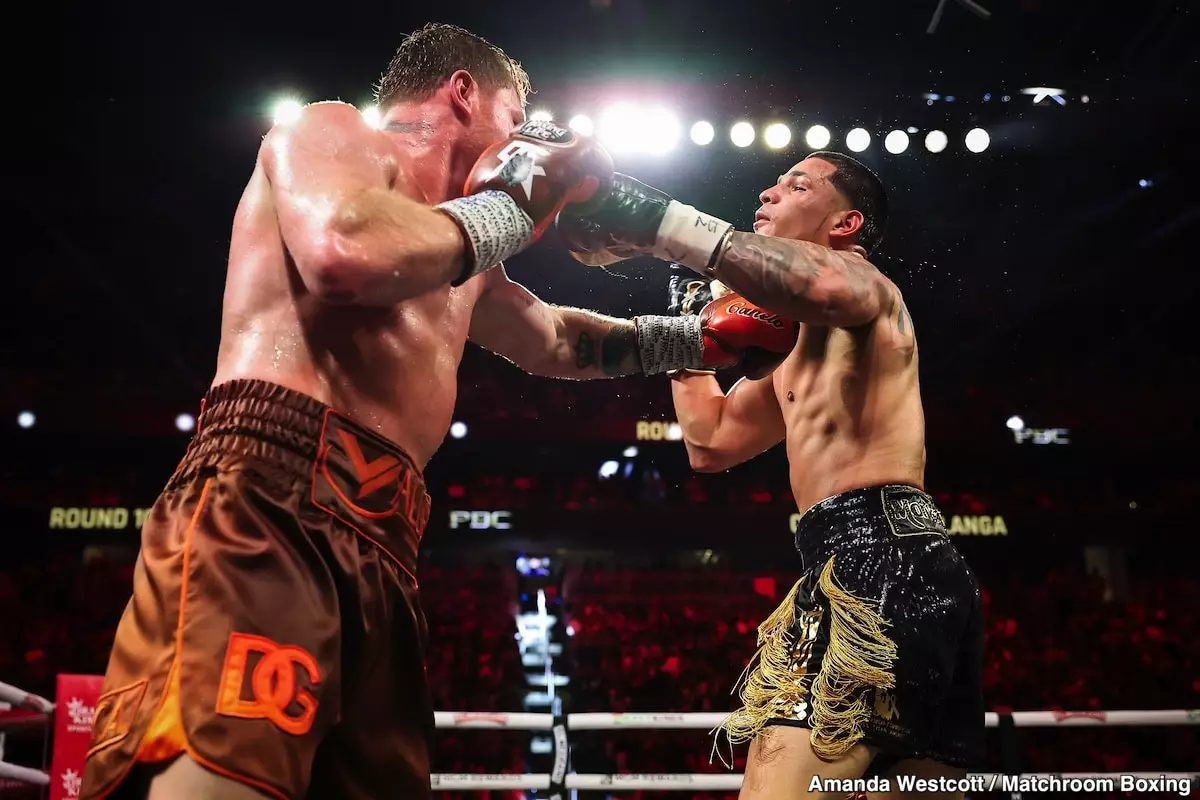BY BOXING HIT STAFF-
The world of boxing often exists within a sphere of intrigue and spectacle, where rivalries play out not only in the ring but also in the court of public opinion. Recent comments by Edgar Berlanga regarding Gervonta ‘Tank’ Davis highlighted not just a personal feud but the broader implications of how success and failure are celebrated or criticized in the sport. The contrasting perspectives of these two fighters offer an insightful lens into the psychology, pride, and public persona prevalent in today’s boxing landscape—a world where the line between victory and defeat can become blurred.
Edgar Berlanga’s animosity towards Gervonta Davis takes root in Davis’ critique of Berlanga’s post-fight mindset following his defeat to Canelo Alvarez on September 14. Berlanga’s attitude, which he defends as a celebration of resilience, stands in stark contrast to Davis’ assertion that glorifying a significant loss is tantamount to “celebrating failure.” Berlanga, who has made a career out of typical underdog story arcs, believes that surviving a battle with a monumental figure like Canelo is a victory in and of itself, despite many fans perceiving it as a hollow achievement.
Also at play here is the notion of different expectations in professional sports. While Berlanga sees himself as triumphant for lasting the distance with a legendary fighter, Davis argues for a more stringent definition of success—one that hinges on actual victories rather than mere participation. Davis’s sharp critique sheds light on an often-unaddressed issue: the crunching reality of sport, where the margins between celebrated champions and forgotten contenders can be razor-thin.
Moreover, there lies the broader commercial context of boxing that complicates these sentiments. Berlanga’s promoters undoubtedly saw market value in the publicity generated by Berlanga’s fight with Canelo, despite the match’s lopsidedness. The disparity between fans’ investment—often substantial for pay-per-view events—and the final product can breed discontent among the audience who may view Berlanga’s participation merely as bait for profit rather than a genuine pursuit of success.
As Berlanga’s rematch with top competition remains elusive, the implications of his loss may lead to a shrinking pool of lucrative opportunities. Fans, disillusioned by an underwhelming show, may question the viability of future matches involving Berlanga. In the often unforgiving epicenter of professional boxing, a reputation can be easily tarnished by a single, high-profile defeat, regardless of the man’s efforts or charisma outside the ring.
The personal conflict gets more explosive through social media dialogues, which serve as the modern-day glass box for fighters to hold their public personas. Berlanga did not hold back in categorizing Davis as a “hater” and a “clown,” enriching the feud with juvenile taunts reminiscent of schoolyard disputes rather than the disciplined exchanges expected among professional athletes. The public relations battle showcases a deeper challenge in fighting culture: how much of one’s persona should rely on dismissive criticisms of others rather than focusing on personal performance and growth.
Berlanga’s assertion that Davis “is not allowed in Puerto Rico” symbolically represents a broader attempt to influence local support and establish a narrative of belonging and pride among fans. Yet, such proclamations can backfire if perceived as petty or exclusionary, potentially disillusioning supporters and highlighting a lack of maturity in the rivalry.
Ultimately, the conflict between Edgar Berlanga and Gervonta Davis is indicative of a more profound struggle within boxing itself—one that grapples with the balance of pride, performance, and expectation in the eyes of fans and fellow fighters alike. Each fighter’s strategy informs how the perception of success and failure can carry different weights depending on the individual’s viewpoint and experiences in the ring. As Berlanga seeks to redefine his narrative following a significant loss, and Davis aims to solidify his status through public denunciation of rivals’ shortcomings, fans and analysts alike will keenly observe how this war of words evolves along with their careers. The boxing world is scrutinizing not just the bellicose exchanges, but the cultural ramifications left in their wake as both fighters navigate the rocky terrain of professional pride and commercial viability.


Leave a Reply